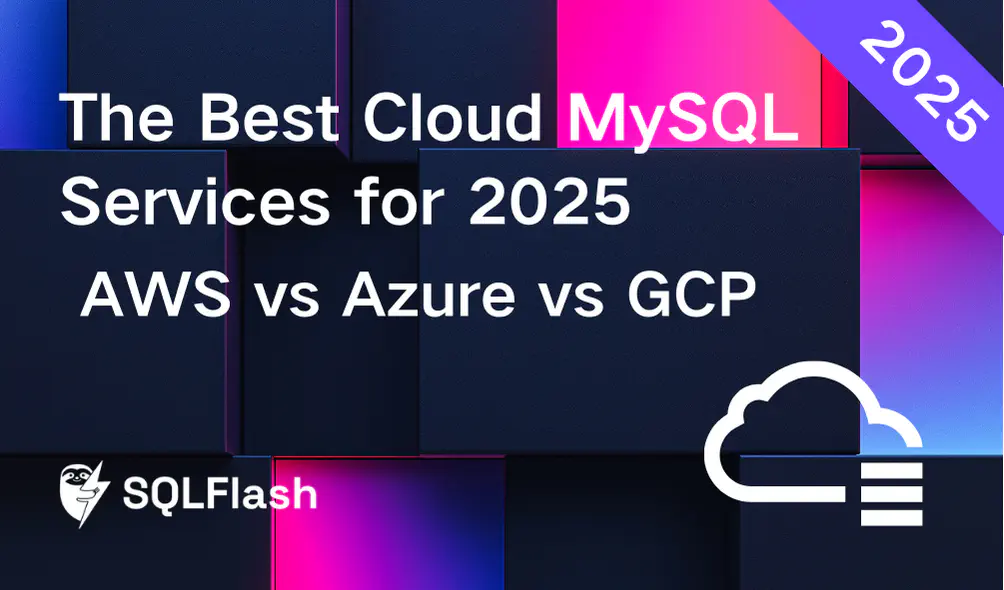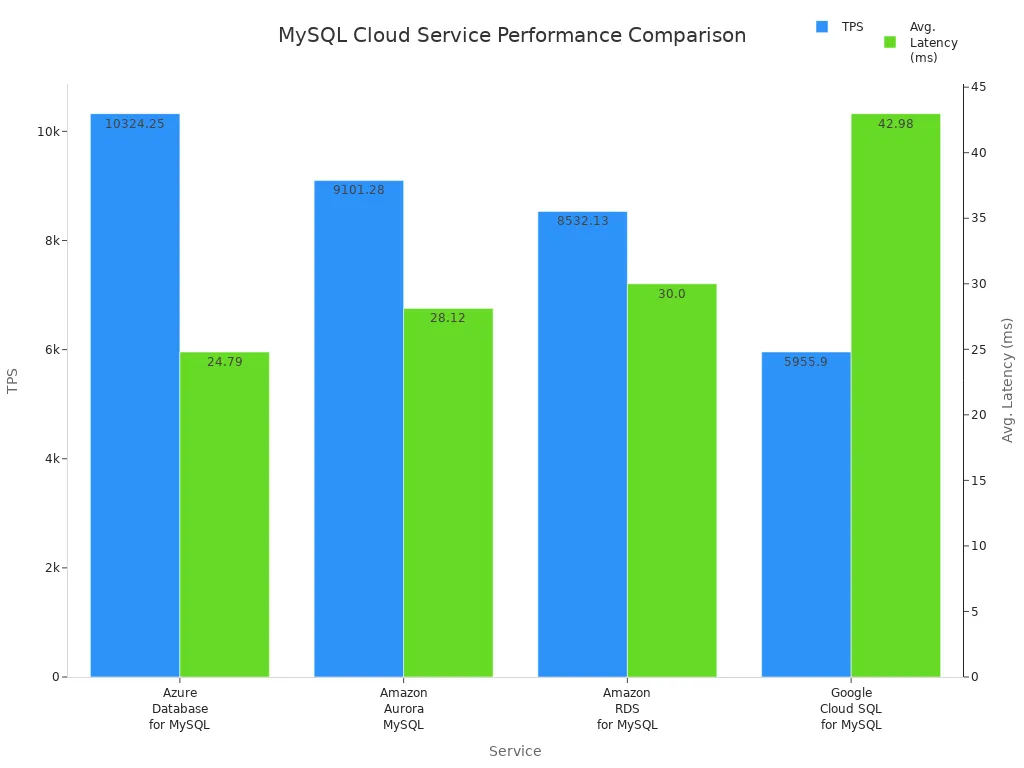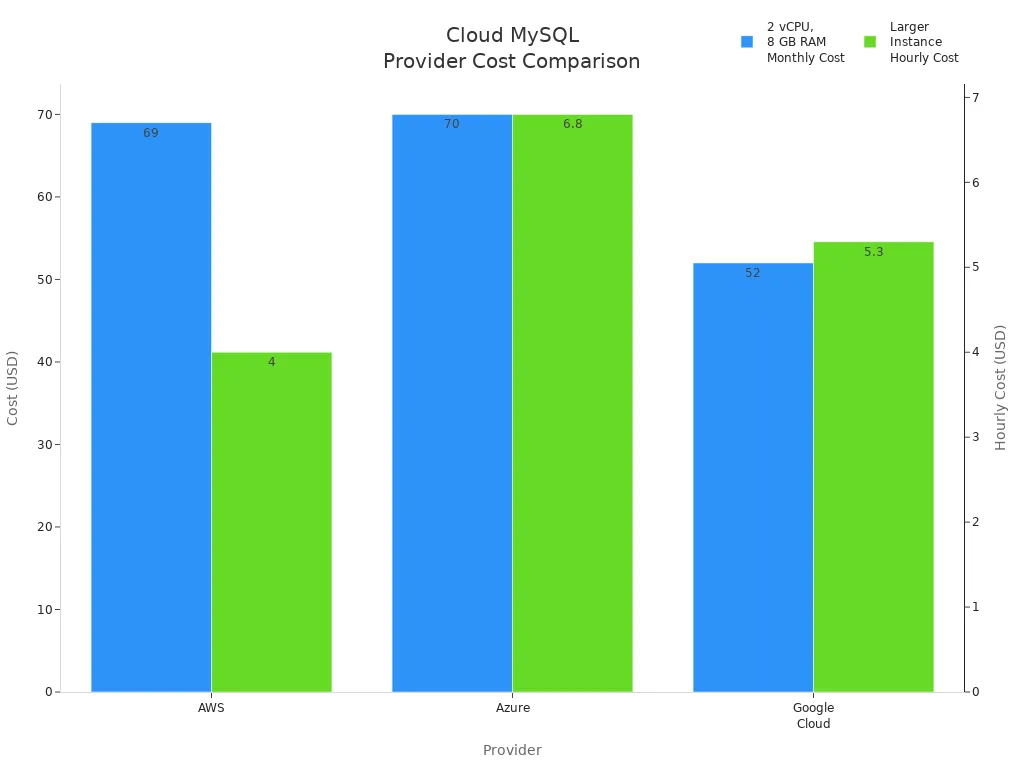The Best Cloud MySQL Services for 2025: AWS vs Azure vs GCP



Image Source: unsplash
You want the best cloud MySQL service for 2025. AWS leads with 30% market share, offering unmatched flexibility. Azure integrates well with Microsoft tools and holds 20%. GCP stands out for cost-saving and advanced AI, owning 13%. Multi-cloud solutions like TiDB Cloud now help organizations with hybrid needs.
Market Share Table:
| Cloud Service | Market Share (%) |
|---|---|
| AWS | 30 |
| Azure | 20 |
| GCP | 13 |
Feature Highlights Table:
| Provider | Flexibility | Integration | AI Capabilities |
|---|---|---|---|
| AWS | High | Broad | Amazon SageMaker |
| Azure | Moderate | Best for MS | Azure ML |
| GCP | Good | Google Apps | Vertex AI |
You can expect a clear side-by-side comparison to guide your decision on AWS Azure GCP MySQL Cloud services.
Amazon RDS for MySQL stands out as a top choice when you need managed database services in the AWS Azure GCP MySQL Cloud landscape. You can launch a MySQL instance in minutes. AWS automates backups, patching, and scaling, so you spend less time on maintenance. Multi-AZ deployments and read replicas boost availability and performance. You get built-in monitoring with CloudWatch and RDS Insights, which helps you track database health.
Tip: Choose Multi-AZ for higher availability if your application cannot tolerate downtime.
AWS RDS offers a range of features that make it attractive for businesses of all sizes. Here is a quick overview:
| Feature | AWS RDS |
|---|---|
| Setup Time | Few minutes |
| Maintenance | Automated (backups, patching, scaling) |
| High Availability | Multi-AZ, read replicas |
| Backups | Automatic, point-in-time restore |
| Monitoring | Built-in (CloudWatch, RDS Insights) |
| Scaling | Automatic (vertical & horizontal) |
| Performance Tuning | Limited (via parameter groups) |
| Security | IAM, KMS, VPC, etc. |
| Customization | Limited |
| Support | AWS Support or forums |
Pricing starts at $0.068 per hour for a db.t3.medium instance. Storage costs about $0.115 per GB per month. Backups are free up to the database size. You can select paid support tiers based on your needs.
You should consider the advantages and disadvantages before choosing AWS RDS in the AWS Azure GCP MySQL Cloud environment.
| Advantages/Disadvantages | Description |
|---|---|
| Advantages | Fast setup, automated maintenance, strong security, high availability with Multi-AZ |
| Disadvantages | Limited scalability (no sharding), higher cost for advanced features, possible single point of failure without Multi-AZ |
AWS RDS delivers reliability and ease of use, but you may face higher costs and some scalability limits. Evaluate your workload and growth plans before making a decision.
Azure Database for MySQL gives you a fully managed cloud solution. You can deploy, scale, and manage MySQL databases with ease. Azure offers predictable monthly charges and pay-as-you-go options, so you control your costs. You benefit from automated infrastructure management, which reduces manual setup and maintenance. If you already use Microsoft products, Azure Database for MySQL fits well into your workflow, but it does not integrate as tightly as Azure SQL Database with other Microsoft tools.
Azure Database for MySQL introduces several new features in 2025. You can use Azure Migrate to discover MySQL servers, assess compatibility, and get SKU recommendations. The unified migration experience with Azure DMS streamlines your move to the cloud. Azure Functions now support native bindings for MySQL, which simplifies event-driven app development.
| Feature | Description | Release Status | Coming Soon! (Tentative) |
|---|---|---|---|
| MySQL Discovery & Assessment in Azure Migrate | Discover servers, assess compatibility, receive SKU recommendations | Private Preview | Public Preview in Q1 CY25 |
| Unified migration experience with Azure DMS | Seamless migrations using Azure DMS and MySQL Import | - | Public Preview in Q1 CY25 |
| Azure DB for MySQL bindings in Azure Functions | Event-driven apps with native MySQL support | Public Preview | General Availability in Q1 CY25 |
You get strong performance and reliability. Azure Database for MySQL achieves 10,324 TPS and 24.79 ms average latency, outperforming other AWS Azure GCP MySQL Cloud services.

Azure Database for MySQL processes up to 16% more TPS than Amazon Aurora MySQL.
You see 14% lower latency compared to Amazon Aurora MySQL.
| Feature | Azure MySQL Services | MySQL |
|---|---|---|
| Licensing | Subscription-based model with pricing tiers | Free and open-source |
| Deployment Options | Cloud-based service | Can be hosted on-premises or in the cloud |
| Infrastructure Management | Fully managed service with automation | Requires manual setup and maintenance |
| Pricing Model | Predictable monthly charges | Costs vary based on hardware and support |
| Scalability | Horizontal and vertical scalability | Manual scaling processes |
| Cost Predictability | Predictable costs with pay-as-you-go options | Costs may vary, leading to unpredictability |
Note: Azure Database for MySQL offers reliable performance and predictable costs, but you may find integration with Microsoft tools less seamless than Azure SQL Database. You should consider your existing infrastructure and future growth when choosing among AWS Azure GCP MySQL Cloud providers.
Cloud SQL for MySQL gives you a fully managed database service on Google Cloud. You can deploy MySQL instances quickly and scale them as your needs grow. The platform automates backups, patching, and failover, so you spend less time on routine tasks. You get seamless integration with Google’s ecosystem, which makes it easy to connect with other cloud services.
Tip: Use Cloud SQL’s automated failover to keep your applications running during outages.
You benefit from a straightforward pricing model with Cloud SQL for MySQL. You avoid hidden costs and complex licensing, which helps you manage budgets more effectively. Cloud SQL works well with major AI platforms, including AWS, Google Cloud, and Azure. This compatibility lets you handle data for AI workloads and run real-time analytics directly in your database.
Key features include:
Automated backups and point-in-time recovery
High availability with regional failover
Built-in monitoring and alerts
Seamless scaling for storage and compute
Integration with Google’s security tools
| Display Name | Source Metric | Description |
|---|---|---|
| Server Up | database/up | Indicates if the server is up or not. |
| Uptime (s) | database/uptime | Delta count of the time in seconds the instance has been running. |
| Pros | Cons |
|---|---|
| Simple pricing, no hidden fees | Limited customization options |
| Strong AI integration and analytics | May require Google Cloud expertise |
| Reliable uptime and automated failover | Performance can vary with heavy loads |
| Easy scaling for growing workloads | Regional availability may differ |
Cloud SQL for MySQL stands out in the AWS Azure GCP MySQL Cloud landscape for cost-effectiveness and AI integration. You should consider it if you want predictable costs and advanced analytics.

Image Source: unsplash
You see modest performance from AWS RDS and Azure at low to medium workloads. When you increase concurrency, AWS RDS and Azure both outperform Alibaba and Google, with AWS securing third place at high connections. GCP does not lead in MySQL benchmarks but excels in data analytics workloads.
| Cloud Provider | Low-Medium Concurrency | High Concurrency |
|---|---|---|
| AWS RDS | Modest | Third place |
| Azure | Modest | Surpasses Google |
| GCP | Not detailed | Strong analytics |
You get high reliability from all three providers. AWS, Azure, and GCP use primary and hot standby setups, synchronous replication, and automatic failover. Amazon Aurora offers advanced quorum replication and creates new servers on failure.
| Service | High-Availability | Replication | Failover |
|---|---|---|---|
| AWS RDS | Hot standby | Synchronous | Role swap |
| Azure | Hot standby | Synchronous | Role swap |
| GCP | Hot standby | Synchronous | Role swap |
| Amazon Aurora | Separate storage | Quorum (4 of 6) | New server |
You benefit from strong security standards across all platforms. AWS, Azure, and GCP meet SOC 2, ISO 27001, PCI DSS, HIPAA, GDPR, and FedRAMP requirements.
| Provider | Certifications |
|---|---|
| AWS | SOC 2, ISO 27001, PCI DSS, HIPAA, GDPR, FedRAMP |
| Azure | SOC 2, ISO 27001, PCI DSS, HIPAA, GDPR, FedRAMP |
| Google Cloud | SOC 2, ISO 27001, PCI DSS, HIPAA, GDPR, FedRAMP |
You find predictable pricing models with all three providers. AWS and Azure offer pay-as-you-go and monthly charges. GCP stands out for cost-effectiveness and simple billing.
AWS lets you start small and scale up easily.
Azure automates scaling and updates for cost-effective growth.
GCP manages storage and server capacity with minimal effort.
You experience fast setup and automated maintenance with each provider. AWS and Azure offer strong integration with their ecosystems. GCP provides simple management and strong analytics tools.
| Cloud Provider | MySQL Service | Performance | Reliability | Security | Pricing | Scalability | Ease of Use |
|---|---|---|---|---|---|---|---|
| AWS | Amazon RDS (MySQL) | High | High | Strong | Moderate | High | Easy |
| Azure | Azure Database for MySQL | High | High | Strong | Moderate | High | Easy |
| GCP | Cloud SQL for MySQL | Good | High | Strong | Low | High | Easy |
Tip: You should match your choice to your workload, budget, and integration needs for the best results.
You need to consider your budget before choosing a cloud MySQL provider. Costs vary by provider and instance size. AWS and Azure offer similar monthly prices for small instances, but Google Cloud provides the lowest cost. Larger instances show more variation, with AWS offering competitive hourly rates and Google Cloud using pay-per-second billing. Discounts such as reserved instances and sustained use can help you save money.
| Provider | 2 vCPU, 8 GB RAM Cost | Larger Instance Cost | Billing Model | Discounts Available |
|---|---|---|---|---|
| AWS | $69/month | ~$4/hour | Pay-per-minute | Reserved instances, spot pricing |
| Microsoft Azure | ~$70/month | ~$6.80/hour | Pay-per-minute | Reserved instances, hybrid benefits |
| Google Cloud | $52/month | ~$5.30/hour | Pay-per-second | Sustained use discounts |

Tip: You can lower costs by choosing reserved or sustained use options.
You should match your technical requirements to the strengths of each provider. AWS supports a wide range of database engines and offers strong automation. Azure integrates best with Microsoft tools and provides evergreen SQL Server versions. GCP excels in analytics and AI workloads, but does not support MariaDB as a PaaS service.
| Cloud Provider | PaaS Database Service | Unique Offerings |
|---|---|---|
| AWS | Amazon RDS | Direct support for PaaS Oracle database |
| Azure | Azure SQL Database | Evergreen version of SQL Server |
| GCP | Cloud SQL | No PaaS Maria DB service |
Note: You should select a provider that fits your existing infrastructure and future growth plans.
You need reliable support for mission-critical workloads. AWS, Azure, and GCP offer different support models and unique features. AWS provides direct support for Oracle databases. Azure delivers evergreen SQL Server versions. GCP focuses on simplicity but lacks MariaDB support.
If you require hybrid or distributed deployments, consider multi-cloud solutions like TiDB Cloud. Multi-cloud strategies offer:
Flexibility to choose the best services from each provider
Scalability for growing businesses
Enhanced disaster recovery and high availability
Freedom from vendor lock-in
You can improve resilience and performance by mixing cloud providers for your MySQL workloads.
You should match your cloud MySQL choice to your priorities.
| Priority | Best Fit |
|---|---|
| Cost | GCP, ScaleGrid |
| Integration | Azure |
| AI/Analytics | GCP |
| Multi-cloud | ScaleGrid |
Consider your current technology stack.
Review your strategic goals.
Look for features like automated backups, disaster recovery, and strong security.
Assess your needs before you decide. Each provider offers unique strengths for different organizations.
Join us and experience the power of SQLFlash today!.